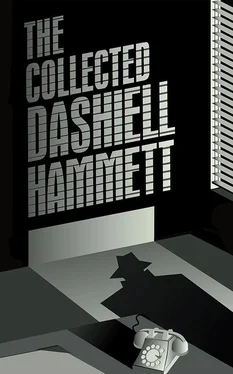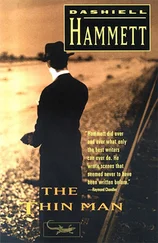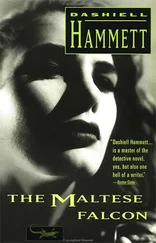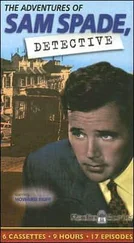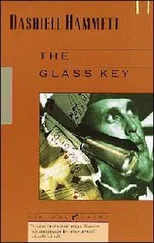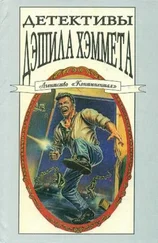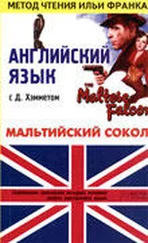“My God!” Owen Sack gasped in utter bewilderment. “And it ain’t no worse than that!”
He bounded to his feet — his pack sliding off — eluded the hands that grasped at him, and ran for the door of Upshaw’s place. On a shelf beneath the cash register he found Upshaw’s black automatic, and, holding it stiffly in front of him at arm’s length, turned back to the street.
His china-blue eyes were wide with wonder, and from out of his grinning mouth issued a sort of chant:
“All these years I been running ,
And it ain’t no worse than that!
All these years I been running ,
And it ain’t no worse than that!”
Rip Yust, crossing the roadway now, was in the middle when Owen Sack popped out of Upshaw’s door.
The onlookers scattered. Rip’s revolver swung up, and roared. A spray of Owen Sack’s straw-colored hair whisked back.
He giggled, and fired three times, rapidly. None of the bullets hit the big man. Owen Sack felt something burn his left arm. He fired again, and missed.
“I got to get closer,” he told himself aloud.
He walked across the sidewalk — the automatic held stiffly before him — stepped down into the roadway, and began to stride toward where pencils of fire sprang to meet him from Yust’s gun.
And as the little man strode he chanted his silly chant, and fired, fired, fired... Once something tugged at one of his shoulders, and once at his arm — above where he had felt the burn — but he did not even wonder what it was.
When he was within ten feet of Rip Yust, that man turned as if to walk away, took a step, his big body curved suddenly in a grotesque arc, and he slid down into the sand of the roadway.
Owen Sack found that the weapon in his own hand was empty, had been empty for some time. He turned around. Dimly he made out the broad doorway of Upshaw’s place. The ground clung to his feet, trying to pull him down, to hold him back, but he gained the doorway, gained the cash register, found the shelf, and returned the automatic to it.
Voices were speaking to him, arms were around him. He ignored the voices, shook off the arms, reached the street again. More hands to be shaken off. But the air lent him strength. He was indoors again, leaning over the firearm showcase in Jeff Hamline’s store.
“I want the two biggest handguns you got, Jeff, and a mess of cartridges. Fix ’em up for me and I’ll be back to get ’em in a little while.”
He knew that Jeff answered him, but he could not separate Jeff’s words from the roaring in his head.
The warmer air of the street once more. The ankle-deep dust of the roadway pulling at his feet. The opposite sidewalk. Doc Johnstone’s door. Somebody helping him up the narrow stairs. A couch or table under him; he could see and hear better now that he was lying down.
“Fix me up in a hurry, Doc! I got a lot of things to tend to.”
The doctor’s smooth professional voice:
“You’ve nothing to attend to for a while except taking care of yourself.”
“I got to travel a lot, Doc. Hurry!”
“You’re all right, Sack. There’s no need of your going away. I saw Yust down you first from my window, and half a dozen others saw it. Self-defense if there ever was a case of it!”
“ ’Tain’t that!” A nice man was Doc, but there was a lot he didn’t understand. “I got a lot of places to go to, a lot of men I got to see.”
“Certainly. Certainly. Just as soon as you like.”
“You don’t understand, Doc!” The doc was talking to him like he was a child to be humored, or a drunk. “My God, Doc! I got to back-track my whole life, and I ain’t young no more. There’s men I got to find in Baltimore, and Australia, and Brazil, and California, and God knows where-all. And some of ’em will take a heap of finding. I got to do a lot of shootin’. I ain’t young no more, and it’s a mighty big job. I got to get going! You got to hurry me up, Doc! You got to...”
Owen Sack’s voice thickened to a mumble, to a murmur, and subsided.
Argosy All-Star Weekly, December 27, 1924
A Ford — whitened by desert travel until it was almost indistinguishable from the dust-clouds that swirled around it — came down Izzard’s Main Street. Like the dust, it came swiftly, erratically, zigzagging the breadth of the roadway.
A small woman — a girl of twenty in tan flannel — stepped into the street. The wavering Ford missed her by inches, missing her at all only because her backward jump was bird-quick. She caught her lower lip between white teeth, dark eyes flashed annoyance at the rear of the passing machine, and she essayed the street again.
Near the opposite curb the Ford charged down upon her once more. But turning had taken some of its speed. She escaped it this time by scampering the few feet between her and the sidewalk ahead.
Out of the moving automobile a man stepped. Miraculously he kept his feet, stumbling, sliding, until an arm crooked around an iron awning-post jerked him into an abrupt halt. He was a large man in bleached khaki, tall, broad, and thick-armed; his gray eyes were bloodshot; face and clothing were powdered heavily with dust. One of his hands clutched a thick, black stick, the other swept off his hat, and he bowed with exaggerated lowness before the girl’s angry gaze.
The bow completed, he tossed his hat carelessly into the street, and grinned grotesquely through the dirt that masked his face — a grin that accented the heaviness of a begrimed and hair-roughened jaw.
“I beg y’r par’ on,” he said. “ ’F I hadn’t been careful I believe I’d a’most hit you. ’S unreli’ble, tha’ wagon. Borr’ed it from an engi... eng’neer. Don’t ever borrow one from eng’neer. They’re unreli’ble.”
The girl looked at the place where he stood as if no one stood there, as if, in fact, no one had ever stood there, turned her small back on him, and walked very precisely down the street.
He stared after her with stupid surprise in his eyes until she had vanished through a doorway in the middle of the block. Then he scratched his head, shrugged, and turned to look across the street, where his machine had pushed its nose into the red-brick side wall of the Bank of Izzard and now shook and clattered as if in panic at finding itself masterless.
“Look at the son-of-a-gun,” he exclaimed.
A hand fastened upon his arm. He turned his head, and then, though he stood a good six feet himself, had to look up to meet the eyes of the giant who held his arm.
“We’ll take a little walk,” the giant said.
The man in bleached khaki examined the other from the tips of his broad-toed shoes to the creased crown of his black hat, examined him with a whole-hearted admiration that was unmistakable in his red-rimmed eyes. There were nearly seven massive feet of the speaker. Legs like pillars held up a great hogshead of a body, with wide shoulders that sagged a little, as if with their own excessive weight. He was a man of perhaps forty-five, and his face was thick-featured, phlegmatic, with sunlines around small light eyes — the face of a deliberate man.
“My God, you’re big!” the man in khaki exclaimed when he had finished his examination; and then his eyes brightened. “Let’s wrestle. Bet you ten bucks against fifteen I can throw you. Come on!”
The giant chuckled deep in his heavy chest, took the man in khaki by the nape of the neck and an arm, and walked down the street with him.
Steve Threefall awakened without undue surprise at the unfamiliarity of his surroundings as one who has awakened in strange places before. Before his eyes were well open he knew the essentials of his position. The feel of the shelf-bunk on which he lay and the sharp smell of disinfectant in his nostrils told him that he was in jail. His head and his mouth told him that he had been drunk; and the three-day growth of beard on his face told him he had been very drunk.
Читать дальше
